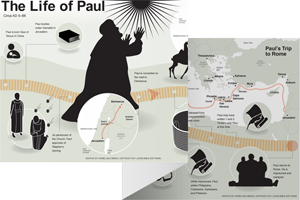15:1–21 As the mission to Gentiles (non-Jewish people) continues forward, the early church is faced with the challenge of understanding theologically how the Gentiles have been accepted into God’s people. The meeting recorded here, regularly called the Jerusalem Council, took place circa ad 49. |
15:1 Unless you are circumcised The Jews practiced circumcision on the eighth day as established by Gen 17:9–14. The Jews here are arguing that a person enters God’s people by becoming part of Israel first.
on the eighth day as established by Gen 17:9–14. The Jews here are arguing that a person enters God’s people by becoming part of Israel first.
15:4 all that God had done The apostles recount their first journey. God’s work clearly demonstrates He has opened the door to the Gentiles (see Acts 14:27).
15:5 the party of the Pharisees Apparently several Pharisees had converted to Christianity. Paul, also a Pharisee (23:6; Phil 3:5), will not agree with their sentiments. See note on John 7:32.
had converted to Christianity. Paul, also a Pharisee (23:6; Phil 3:5), will not agree with their sentiments. See note on John 7:32.
15:6 the apostles and the elders Luke (the narrator) stresses that the ruling of the Jerusalem Council will represent the Church’s official verdict on the matter.
15:7 in the early days Peter cites his own experience with the Gentile Cornelius and his vision about clean and pure food, which he has already explained to the church leadership in Jerusalem (Acts 10:1–11:18).
15:10 why are you putting God to the test Peter reasons that since God is working among both Jews and Gentiles that to demand that the Gentiles become Jews is to doubt what God has declared. This point seems to be based on Peter’s vision about clean and pure food (10:9–23).
have been able Peter reminds the audience that no Jew was able to satisfy the law.
15:13 James The half-brother of Jesus and, according to the early church fathers, the author of the book of James (see Matt 13:55; Mark 6:3; Jas 1:1 and note).
15:15–18 James quotes from Amos 9:11–12. |
15:16 the tent of David This refers to the humbled Davidic dynasty (see note on Amos 9:11). God promised to restore the dynasty to fulfill his promises about the royal line (2 Sam 7).
15:20 Each of the four practices mentioned in this verse took place regularly in Gentile culture and worship and were condemned by Jews as unclean. |
15:22–29 The letter from the Jerusalem Council codifies its conclusions. It aims to make theological unity within the church a practical reality. |
15:22 Silas Silas is mentioned here for the first time; he will accompany Paul on his later travels (Acts 15:40; 2 Cor 1:19; 1 Thess 1:1; 2 Thess 1:1).
15:29 See note on Acts 15:20. |
15:30–35 The church of Antioch rejoices after reading the letter, which has encouraged their unity and love for each other. |
15:34 This verse is not found in the oldest and most reliable manuscripts. Only two of the major manuscripts |
15:36–41 As Paul’s second missionary journey (circa ad 49–51) begins, he and Barnabas disagree on whether to keep John Mark with them. |
Event | Approximate Date |
Paul’s first missionary journey (13:1–14:28) | ad 46–47 |
Paul’s second missionary journey (15:40–18:22) | ad 49–51 |
Paul’s third missionary journey (19:1–21:26) | ad 52–57 |
15:37 Mark Barnabas’ cousin (see Col 4:10). See note on Acts 12:12.
15:38 departed Because of the timing of his departure, it may be that John Mark left because of uneasiness with going further into Gentile regions. See 13:13.
15:39 Cyprus One of the locations where Paul and Barnabas initially ministered (13:1–12). It is also Barnabas’ home area (4:36).
15:41 Syria and Cilicia Two neighboring provinces in modern-day Turkey. While Barnabas serves the church in Cyprus, Paul journeys through these areas toward Derbe and Lystra.

|
About Faithlife Study BibleFaithlife Study Bible (FSB) is your guide to the ancient world of the Old and New Testaments, with study notes and articles that draw from a wide range of academic research. FSB helps you learn how to think about interpretation methods and issues so that you can gain a deeper understanding of the text. |
| Copyright |
Copyright 2012 Logos Bible Software. |
| Support Info | fsb |
 Loading…
Loading…


